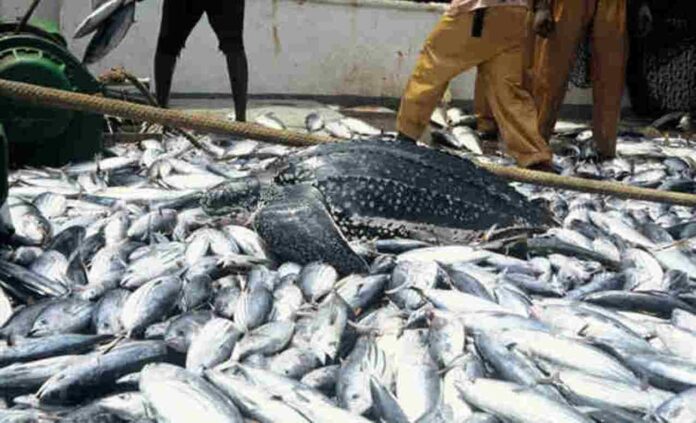Russia leads in fish import bill worth N500b
By Jeph Ajobaju, Chief Copy Editor
Russia is the leading exporter of fish to Nigeria among nine major suppliers traversing Europe, South America, and North Africa that have shipped in about N500 billion worth of the delicacy in the past 11 months.
Russia led in 2000 with $253.6 million worth of exports to Nigeria. Between January and March this year (Q1 2021), Russia alone exported N27.23 billion worth of blue whiting to Nigeria, which, ironically, is the biggest producer of fish in Africa.
Higher imported fish products since 2015 and the devaluation of the naira in 2019 have prevented domestic fish production from competing with imports.
Industry players warn that plans by the federal government next year to ban the importation of fish, an essential staple food, may fail because high demand ensures the volume and worth of smuggled fish are higher than official imports.
National Bureau of Statistics (NBS) data shows that by Q2 2021, blue whiting worth N62.4 billion was imported, herrings (N35.53 billion), and mackerel (N25.75 billion), per reporting by The Nation.
Sources at the Federal Ministry of Finance told the newspaper that fish worth over N200 billion was imported by July and November.
“This amount is far below the worth of the fish that were smuggled into the country from the neighbouring countries in the last 10 months,” a source confided.
__________________________________________________________________
Related articles:
Nigeria has highest malnutrition rate in Africa, second highest globally
CBN may restrict forex for $2b wheat import to raise local production
Nigeria mounts up N3.1b food import bill as local production struggles
__________________________________________________________________
Nigeria’s fish deficit
Nigeria has a fish deficit of 2.5 million metirc tonnes which affects protein intake among the poor North and South.
A source at the Nigerian Ports Authority (NPA) reiterated that fish demand has grown faster than supply, resulting in an increase in imports.
“Fish demand in Nigeria has far outpaced supply as the import share rose from 16 per cent in 1970 to 39 per cent by 2017. But little is known about who is consuming the imports: rural versus urban, rich versus poor.
“Fish is among the most important animal-sourced foods in Nigeria and other African countries and is crucial in combatting malnutrition,” he said.
Nigeria has imported over N1 trillion ($2.06 billion) worth of fish from nine countries in the past two years.
Imports rose 38 per cent or $480.2 million from S789.74 million in 2019 to $1.27 billion in 2020.
NPA inventory shows that six vessels offloaded 27,836 metric tonnes (mt) of fish at the Lagos Port:
- Green Karmoy – 4,200 mt
- Green Freezer – 4,100 mt
- Nova Floridaa – 4,200 mt
- Belbek – 3,162.69 mt
- Frio Las Palmas – 6,609.24 mt
- Kano Reefer – 5,565 mt
International Trade Statistics (ITS) data shows that the major suppliers are Russia, Norway, The Netherlands, Iceland, Poland, Chile, Ireland, Mauritania, and Japan.
The money worth of their fish export to Nigeria in 2020 is as follows:
- Rusia – $253.6 million
- The Netherlands – $212.02 million
- Chile – $138.7million
- Iceland – $100,2million
- Ireland – $57.05million
- Norway – $92.3million
- Poland – $33million
- Mauritania $53.3million
According to ITS data, Japan has overtaken Norway by 73.87 per cent since 2018 in fish export to Nigeria.
Nigeria’s fish import from Japan rose from $1.04 million or 2.14 per cent in 2016 to $48.62 million (97.8 per cent) in 2018. It was worth $28.57 million in 2017.
Pacific mackerel from Japan, which costs $850 per tonne, is 43 per cent cheaper than the price of the Norwegian species which sells for $1,500 per tonne.




